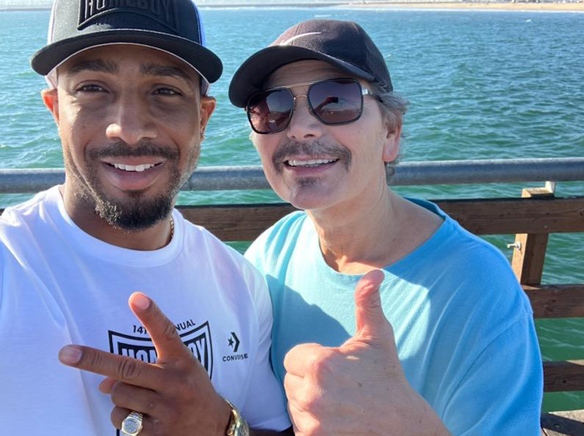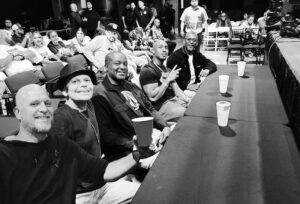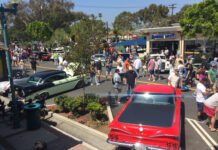
A former prison guard recently reached out to a former inmate. Seal Beach resident Richard Glassman, 62, wanted to know how Joseph Herd Jr., 30, was doing. This was not idle curiosity. In 2014, Glassman risked his life, sacrificed his health and career, to prevent Herd’s murder. He wanted to know it had been worthwhile.
It was their first meeting in years.
They first met in the Ventura Youth Correctional Facility. As the Sun reported in 2015, Glassman said the majority of the Ventura wards were in for gang related murders or attempted murders.
Glassman was a counselor (that’s what they call guards in youth corrections) and Herd was a ward (that’s what they call inmates in youth corrections).
Last month, during a phone interview, Herd called Glassman a “c.o.,” which is short for corrections officer.
Referring to his time in corrections, Herd said he was having mental issues due to deaths in his family.
In 2015, Glassman told the Sun that he had never loved a job before he became a corrections officer.
Glassman got his degree in criminal justice, but spent many years working in car sales before pursuing his life’s ambition. In 2007, he became a corrections officer.
During a recent phone interview, Herd described his imprisonment as being confined 24 hours a day, seven days a week, for months and years at a time. Herd said you don’t get access to anything but the people who come and go.
Herd said crime can be done in minutes, but punishment can go on for years.
Herd said you still have a heart; have a soul. According to Herd, some people working in corrections just have a miserable attitude. Herd didn’t want to put a spotlight on anyone in particular, but he said some people there were despicable. Herd said a lot of people working at corrections facilities lose sight of that. Herd said people would not see an inmate as someone to talk to or someone who needs help.
Not, apparently, Glassman.
“He was a blessing to be around,” Herd said.
“Every day, I could get a smile, a verse from the Bible, or something to make me laugh,” Herd said.
“We became cool,” Herd said.
“His presence was powerful,” Herd said. Herd said Glassman had an impact on a place that was dark.
Later, Joseph Herd Sr. said it was traumatic for him and he wasn’t doing time.
Glassman’s job included supervising wards and protecting them from each other. Rehabilitation was also part of his job, such as teaching the wards anger management.
“People need to know that people can change,” Glassman said.
“Hitting a kid doesn’t change behavior,” Glassman said.
Glassman said he’s seen white kids arrested for stealing cars and they don’t go to Corrections. He argued that the system is rigged against Blacks.
Glassman said the teachers come to the unit, rather than the wards going to school.
There were also contests on holidays such as Mother’s Day and Thanksgiving.
Both Glassman and Herd were assigned to a unit for wards who refused to integrate with other inmates.
Glassman called it the hard core unit. “The worst of the worst,” Glassman said.
(In a 2015 interview, Glassman said most of the wards were in for either attempted murder or murder. He said three of his eight assailants were murderers.)
However, Glassman also said that in his opinion most of the inmates were not sociopaths.
According to Glassman, one of the state’s goals was integration of the corrections system.
“The state created a tremendous problem,” Glassman said.
Joseph Herd Jr. was the only Black inmate in the facility at the time. Glassman would take Herd into a room. Another counselor (guard) would bring in another ward. The two inmates would fight. Glassman described Herd as a “good fighter.”
Glassman thinks the Corrections Department did Herd a disservice. Glassman said the state created a gladiator atmosphere in the prison.
Glassman said Herd never attacked staff. Glassman got Herd to humanize people.
The night of March 9, 2014, according to Glassman, Hispanic wards were bragging about the killing of a Black corrections officer at another facility.
Joseph Herd Jr. was scheduled to be transferred out of Ventura Youth Correctional Facility.
On March 10, 2014, one of the other wards asked an officer if he could call his mother. Glassman went in to set up the phones. According to Glassman, there were concerns that the inmates would not get along with Black officers.
Glassman set out the phone.
Glassman was attacked—stomped might be a better word—by eight wards. They told him it wasn’t personal. They said they liked him. They wanted his key so he could access another part of the building. That key would have given them access to the only Black ward before he was transferred to another facility. They told Glassman that they wanted to kill Herd.
Glassman didn’t let go of the key. (In fact, he still has it mounted on a plaque.)
He said he could not put up his hands to defend himself because he used both hands to protect the key.
Another corrections officer tried to rescue Glassman. He, too, was attacked. Eventually, the corrections officers were rescued. The eight attackers ultimately got another 13 years of prison time.
Glassman has endured multiple surgeries and wears hearing aids. His body cannot regulate his blood pressure. He suffered neck fusion and back fusion. Glassman said some of his colleagues thought he was crazy to hold onto the key. But Glassman was a sworn officer. He took an oath.
“I knew they were after Joseph, but I couldn’t live with myself if I didn’t protect Joseph,” Glassman said.
“I’d rather die for something than live for nothing,” Glassman said.
Glassman said he would do it again.
Herd apparently didn’t know about that attack until later.
Herd was told Glassman’s injuries left him unable to work. Herd said he always thought about what they were trying to do to get the key to get him. Herd said he felt guilty about that.
“He was a good dude,” Joseph Herd Jr. said.
During the phone interview, Joseph Herd Sr. got on the line to praise Glassman.
“It’s really remarkable that he put his life on the line to defend my son’s life,” said Joseph Herd Sr.
“I want to meet the man himself and shake his hand,” said Joseph Herd Sr.
“He achieved some growth,” said Joseph Herd Sr.
In 2015, Glassman received the Medal of Valor for what he did and was later honored by the Seal Beach City Council. At the time, Glassman hoped to return to law enforcement.
According to Glassman, Joseph Herd Jr. was eventually released. However, he was later arrested again. According to Glassman, Herd had a gun. Glassman believes he had it because Herd was afraid.
According to Glassman, Herd ended up in Pelican Bay.
At length, Herd was released on parole.
Glassman has a friend who is a parole officer. One day, that friend received a photo from one of his parolees. One of the people in the photo was Herd. The friend told Glassman that Herd was out of prison and Glassman decided to reach out.

“I think of Joseph all the time,” Glassman said.
Meeting Herd again was on Glassman’s bucket list.
In mid-October 2023, after eating at Walt’s Wharf, they took a walk on the pier.
“We had a fantastic day in Seal Beach,” Glassman wrote in a text message.
“We met an elderly woman who just lost her husband and Joseph immediately showed sympathy and they spoke for a while,” Glassman wrote.
“The conversation ended with Joseph asking her if it was all right to give her a hug,” Glassman wrote.
They hugged. Glassman said Herd kept showing him positive energy all day.
If, as Glassman argues, the state failed Herd when he was in the Ventura facility, Glassman thinks the state is doing right by him now. Glassman said he thinks the Corrections Department did a great job of teaching Herd life skills.
Glassman said the state used to give a released prisoner $50 and tell him to have a nice life.
Glassman said Joseph was one of 30 inmates admitted to the Creating Restorative Opportunities and Programs.
(“CROP provides formerly incarcerated individuals with full service reentry support and 12 months of intensive training to succeed in tech focused careers,” according to the program website.)
Glassman also thinks age has slowed Herd down. Herd is 30.
Joseph Herd Jr. said he is currently working for Homeboys Industries, is taking online classes in selling tech to businesses and is doing volunteer work at a cemetery in Compton. (“Homeboy Industries is the largest gang rehabilitation and re-entry program in the world,” according to their website.) Herd said he is looking to pursue a boxing career.
Herd said it was good to know that Glassman was at peace. Herd said it was good to see that Glassman is still in a good, positive place in his life. Herd described seeing Glassman again as a blessing.
Herd believes their meeting at Walt’s Wharf was good for both of them.
Last Saturday, Nov. 11, Glassman and some officers from their old prison took Herd to a boxing match. Glassman sponsors a boxer and described it as a huge match.
“It was so great, because in the circle of life, a person’s past can’t define what they can become,” Glassman wrote in a Nov. 12 text to the Sun.
“Joseph is now my mentor,” Glassman said.
Glassman said that every night, Herd calls Glassman and asks Glassman how his day was.
“It’s kind of flipped. I’m still helping him and he’s helping me,” Glassman said.











